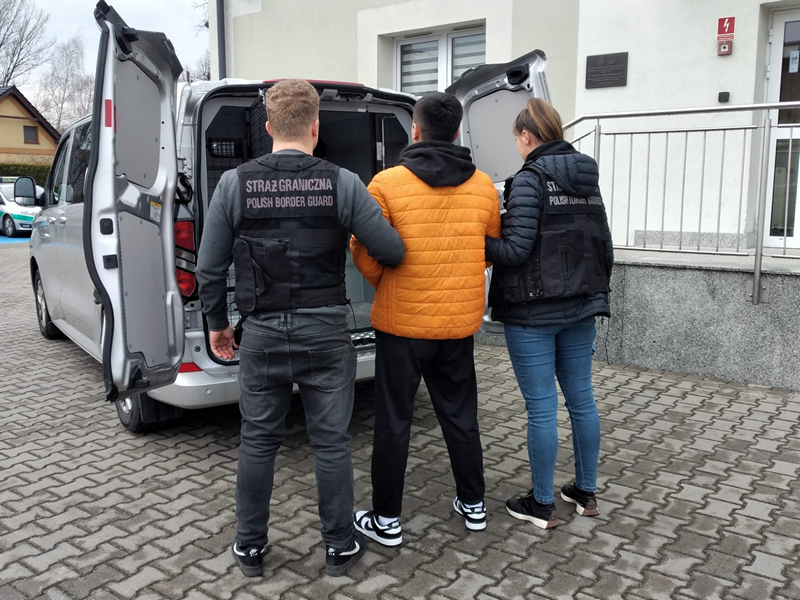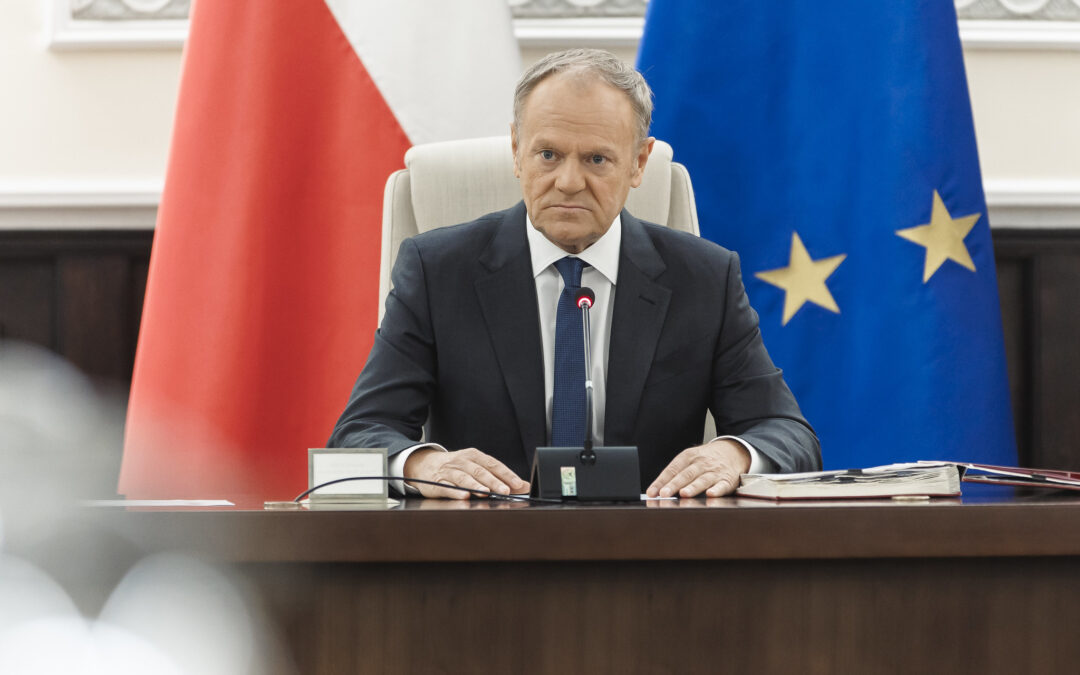Keep our news free from ads and paywalls by making a donation to support our work!

Notes from Poland is run by a small editorial team and is published by an independent, non-profit foundation that is funded through donations from our readers. We cannot do what we do without your support.
By Małgorzata Tomczak
Earlier this year, Polish media and politicians spotlighted a surge in crime committed by foreigners, which came following years of unprecedented mass immigration to Poland.
Following a report by the Rzeczpospolita daily claiming that Poland was witnesses a return to 1990s-style violent, organised crime, interior minister Tomasz Siemoniak declared in an interview that “we will not allow criminal groups, whether Polish or foreign, to roam here in any way.” He promised mass arrests, convictions and deportations.
Warsaw mayor Rafał Trzaskowski echoed this, noting that while the city remains safe, authorities are signalling “zero tolerance for lawbreaking”. Meanwhile, Prime Minister Donald Tusk said that “guests who abuse our hospitality and violently break the law will be deported”.
Poland is experiencing a growing wave of "imported organised, brutal crime" carried out by some immigrants, in particular from Georgia, says the interior minister.
He blamed the "uncontrolled influx of migrants" allowed by the former government https://t.co/DPMktNKHdk
— Notes from Poland 🇵🇱 (@notesfrompoland) February 4, 2025
Soon they moved from words to deeds. In February, police and border guards detained about 1,500 foreigners in a joint operation. A week later, Siemoniak reported that 2,616 foreigners had been charged and 398 were facing expulsion.
The Polish border guard now regularly announces deportations – mostly Georgians, occasionally Uzbeks and Tajiks – while leaders like Tusk applaud it on social media. “Deportations have begun. We’re dismantling Georgian gangs. Actions, not words,” he posted on X in March.
The frequency of these reports suggests that rising foreign-driven crime ranks among Poland’s major social issues. However, Małgorzata Tomczak, a migration expert, shows that official data themselves indicate the story is not so simple.
Is crime committed by foreigners in Poland rising?
Overall, crime rates in Poland have steadily declined for the last 20 years. Detected crimes fell from nearly 1.5 million in 2004 to 915,081 in 2014, halving again to 439,796 last year.
In absolute terms, crimes by foreigners have risen. The number of foreign nationals charged with criminal offences rose from 2,530 in 2015 to 7,774 in 2019, peaked at 17,294 in 2023, then dropped slightly to 16,437 in 2024.
But these figures must be seen in the context of Poland’s increasing foreign population, which grew from roughly 200,000 in 2015 to an estimated 2 million in 2019 and around 2.5 million today (some sources suggest that the number might be above 3 million, factoring for undocumented residents).
The number of foreigners in Poland’s social insurance system rose 6% in 2023 to reach 1.13 million. Immigrants now make up almost 7% of all those in the system
The largest increases were recorded by Belarusians, Ukrainians, Indians, Colombians and Nepalis https://t.co/eA1QVo0ydH
— Notes from Poland 🇵🇱 (@notesfrompoland) January 27, 2024
The proportion of foreigners committing crimes stood at 1.45% in 2015, dropped to 0.39% in 2019, and rose to 0.65% in 2024 (or even lower if considering the higher, undocumented population estimate). Thus, despite the significant migration influx, foreigners in Poland today commit less crime than they did a decade ago.
According to Siemoniak, in 2024 foreigners accounted for 5% of all criminals in Poland. As foreigners comprise at least 7% of Poland’s population, they are underrepresented in the overall crime count. It is actually Poles who commit more crimes than their population share – they constitute 93% of the population and are responsible for 95% of all crimes.
What are the most common offences committed by foreigners?
Foreigners are most often detained for drink driving, theft and drug possession. The biggest jump has been observed in driving-ban violations, which have increased nearly fivefold since 2020, while document forgery cases have doubled across that period.
The two largest groups of foreign nationals living in Poland are Ukrainians (of whom there are 1.5 million, per the interior ministry) and Belarusians (306,447, per Eurostat).
Unsurprisingly, therefore, of the 16,437 foreigners charged with crimes last year, a majority of cases (9,753) were Ukrainians – most often for drink driving (2,943), theft (930) and fraud (461) – with the second largest number (1,122) involving Belarusians.
Georgian gangs
While overall migrant crime trends are not cause for alarm, there has been a notable rise in violent crimes committed by Georgians, who were charged 1,780 times in 2024.
With a diaspora of 25,000 to 40,000, Georgians comprise just 1 to 1.6% of all foreigners yet account for 11% of migrant crime. Their crime rate (4% to 7.1%) far exceeds both the 0.65% foreigner average and the national rate.
Georgian bakeries have become a common sight in Polish cities amid a boom in immigration from the Caucasian state.
Poland's growing economy has made it an attractive choice, while Georgians also say it feels culturally closer than Western countries https://t.co/hebNClOto3
— Notes from Poland 🇵🇱 (@notesfrompoland) November 20, 2024
Unlike other foreigners, Georgians were mostly charged for theft and robbery (472 cases), alongside drink driving (334) and drug possession (200). In Warsaw, which has a 5,000-strong Georgian community, they racked up 532 crimes – 20% of all crimes committed in the capital by foreigners – including 90 serious robberies and 78 sexual offences.
Their criminal behaviour is often marked by brutality. In 2023, a Georgian gang of three committed multiple burglaries in towns near Poznań, smashing windows, looting and vandalising apartments. The often elderly victims reported in court that the loss of valuables was nothing compared to the heavy psychological trauma.
“I can’t live alone anymore. I moved from my house out of fear,” a 66-year-old woman said, quoted by news website Wirtualna Polska. “I started shaking, I couldn’t stand up, I was afraid they would come back in a moment. My mental health has been ruined,” recounted another victim.
Georgians also top the deportation lists, with 2,783 expelled in 2023 and 2,589 in 2024. The effectiveness of deportations is often questioned, as those removed can try to re-enter Poland using illegal routes. However, in this case they may have actually curbed crime committed by Georgians, as 1,780 were charged in 2024 compared to 2,714 in 2023.
What drives Georgian crime?
During an interview in February, Siemoniak said that there is a growing wave of “imported crime” because of a “completely chaotic…visa policy, which led to the sale of Polish visas and entry here to anyone who wanted it”.
He was referring to the visa scandal under the former national-conservative Law and Justice (PiS) government, in which it is alleged that some migrants were able to pay to obtain easier access to Poland.
Two more weeks to save @notesfrompoland!
We're halfway through our campaign and we've received 300 donations from our readers. Thank you for the generous support!
But to continue our work we still need your help. Click below to learn more https://t.co/0gVkMlaA0W
— Notes from Poland 🇵🇱 (@notesfrompoland) April 15, 2025
But the interior minister’s comments do not hold up to scrutiny. Although it appears to have involved serious corruption, the visa scandal concerns only a small proportion of the total number of visas issued under PiS.
Instead, Poland’s increasing immigration rate has been driven by refugees fleeing the war in Ukraine and labour shortages forcing employers to hire from abroad.
Moreover, foreigners are committing fewer crimes than Poles, and their crime rate keeps dropping. The exception is among Georgians, who since 2017 have had visa-free access to the EU.
A parliamentary committee investigating alleged corruption in Poland’s visa system under the previous government has adopted a final report.
It will notify prosecutors of suspected crimes by 11 people, including former Prime Minister Mateusz Morawiecki https://t.co/RovQ8hTIF1
— Notes from Poland 🇵🇱 (@notesfrompoland) December 4, 2024
Paweł Moczydłowski, a Polish sociologist, criminologist and former head of the central board of prisons at the justice ministry, told me: “The situation is puzzling. Georgians don’t strike me as a particularly ‘criminal’ nation. This overrepresentation in crime statistics raises some questions.”
According to Moczydłowski, the brutality of crimes committed by Georgians suggests that specific groups led by so-called vory v zakone (a Russian phrase meaning “thieves-in-law”) might now operate in Poland.
These are criminal groups that thrived in the USSR and have been repeatedly used by the Soviet and Russian state, both during the Cold War and today, for political purposes – to fight democratic regimes, stifle independence aspirations, and exercise control over society. Although they are usually deployed against former Soviet republics, Moczydłowski believes they are now being used as a form of “hybrid warfare” with the West.
“This is nothing new. During the Cold War, Russia used ‘exported crime’ as an element of total war aimed at destabilising Western democracies,” he says. “Today the scale is smaller, but the instruments remain similar.”
“It’s not as simple as a criminal group being sent overseas,” Moczydłowski explains. “Russia, as an authoritarian regime, exerts control over its immigrants and can deliberately orchestrate population flows into Europe.”
Poland is facing a new type of threat: Russia's recruitment of civilians – often migrants from Ukraine and Belarus – to carry out espionage and sabotage.@adam_lelonek explains why this trend has emerged and how the Polish authorities have responded to it https://t.co/GSeBMlbPuV
— Notes from Poland 🇵🇱 (@notesfrompoland) April 9, 2025
It often encourages the most impoverished migrants to enter Europe, as their material conditions make them more susceptible to radicalisation and petty crime. Once they have settled, seasoned operatives directed by vory networks are embedded into migrant communities, from which they recruit and direct individuals.
“The foreign criminals, due to operating outside of the law, grow more reliant on protection from vory networks,” Moczydłowski continues. “The complexity of this system keeps the actual principals elusive and hard to trace.”
An attack on democratic values?
Moczydłowski argues that the shocking violence of crimes committed by Georgians has the effect of spreading fear, triggering “social paralysis” and fostering anomy, ultimately fracturing society and eroding trust in the state.
He stresses that, while during his career in the prison service he worked on liberalising repressive laws, today he supports politicians’ harsh stance on foreign criminals and mass deportations.
“If the goal is to threaten society, the state has to take firm actions and send a message: ‘We’ve got this situation under control.’ Otherwise, widespread fear would only grow.”
However, he sees problems in the way the media presents crime news in a sensational, clickbait manner. It creates a feeling that the scale of crime is enormous, although the data clearly contradict this.
It also creates an atmosphere of fear, which can increase xenophobia and set the ground for tightening laws. The price will be paid by ordinary foreigners, especially the most numerous – Ukrainians – which is likely Russia’s goal.
While politicians’ strong and vocal narrative of fighting migrant crime might help provide a sense of control – in the specific context of deportations – the overall discourse on crime committed by foreigners is clearly disproportionate.
Poland is already a country of mass immigration, but politicians have been reluctant to acknowledge it.
The last week has seen the start of a much-needed debate on how the country should respond to its new reality, writes @danieltilles1 https://t.co/566KjU7kd0
— Notes from Poland 🇵🇱 (@notesfrompoland) October 17, 2024
The immigration wave to Poland in the past decade has gone hand-in-hand with a decline in crime – both overall and among migrants themselves. Migrants commit relatively fewer crimes than Poles.
Given how migration is routinely weaponised in Poland for political gain – with such rhetoric ramped up before elections – the current narrative around migrant crime is no doubt related to next month’s vote to choose a new president.
Such a strategy, when used by mainstream parties, is often justified as “taking fuel away from the far right”, particularly since some of its politicians have pro-Russian leanings.
The problem is that Russian propaganda actively fuels social divisions by spreading anti-immigrant sentiment. In an increasingly multicultural Poland, the push for “control over dangerous migration” risks becoming a double-edged sword.

Notes from Poland is run by a small editorial team and published by an independent, non-profit foundation that is funded through donations from our readers. We cannot do what we do without your support.
Main image credit: Straż Graniczna (under CC BY-NC-ND 3.0 PL)




















